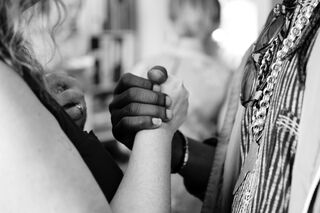Bipolar Disorder
Develop Training to Support Colleagues with Mental Illness
Common humanity should be at the core of training.
Posted July 1, 2022 Reviewed by Gary Drevitch
Key points
- Training based on common humanity helps people to relate to colleagues with mental illnesses.
- Training should encourage mutual respect, instead of pity, which lowers expectations.
- The training also inspires hope and empowerment, and alleviates marginalization and stigma.

Inspired by my experience as a researcher, advocate and consumer.
Mental illnesses and their associated stigma cause tremendous amounts of suffering to the persons with these health conditions, including in their careers. This post outlines a few principles for developing training for supervisors and colleagues to support employees with mental illnesses in the workplace.
I mainly use examples of persons with Serious Mental Illnesses (SMI) for two reasons: First, I am most familiar with these conditions as a researcher, an advocate, and a consumer who is experiencing bipolar disorder in remission. Second, these illnesses are associated with pervasive dehumanizing stigmas, which can make them difficult to relate to.
Based on my experience of working with persons with mental illnesses and family members and friends, I suggest a few helpful approaches, and also caution against approaches that I believe ineffective or even counterproductive. Overall, I advocate for training that pursues empathy, understanding, and mutual respect by exercising our common humanity. Before going into the weeds of what the training should look like, I will first define what common humanity is by showing how I found its existence in my life.
A search for common humanity
Society tends to see persons with SMI as inherently and irrevocably different from "normal" people; thus they are labeled as the perpetual "other"—unpredictable, incompetent, and, to some, even dangerous. I would argue that this misperception is, if not the root cause, at least an important reason behind prejudiced, discriminatory, and cruel actions against persons with SMI. SMI makes a person a member of "them"—no longer "one of us." Many people hide their diagnosis, because they know that after their disclosure, a good proportion of people would likely see them in a different light or not know how to interact with them without awkwardness, even if they have the best of intentions. As a result, many people with SMI choose to stay in the shadows to remain "one of us."
I disclose my diagnosis when I am doing advocacy. The pervasive "othering" effect does not spare me, so in response, I have developed skills to minimize its impact. After the initial shock of the revelation ("You don't look like you have bipolar at all”), I usually offer people how I would want them to see persons with SMI:
We are not so different from everyone else. The illnesses make our life more challenging indeed, but by no means is this illness everything about our lives. We are just fellow human beings who want a good life.
Actually, this is not a small thing to ask. It requires some good exercise of empathy when rampant otherness has been ingrained in everyone's mind. Using myself as an example, even though I have bipolar disorder, I still felt very confused when a good friend of mine started to show symptoms of psychosis. I kept on asking myself how that felt; it was beyond my imagination. As a result, I embarked on a journey of reading books written by persons with various mental conditions, including schizophrenia, dissociative identity disorder, autism, ADHD, and others. At first, I thought I wanted to help my friend, but later I realized a deeper reason: I wanted to prove that if I was able to relate to these people's lives, then others should be able to relate to mine.
Define common humanity
I found understanding and relating to the lives of people with other types of mental illnesses much less challenging than I expected, not just because we shared similar symptoms or faced similar stigmas, but because despite our differences, we largely wanted the same things: We want to stay healthy, have a well-paying job and a supportive family, and to be heard, respected, and treated fairly. Doesn't everyone, whether they have a mental illness or not, want the same thing? I call this commonality one aspect of common humanity. This phrase has more meaning than commonality.
Despite the commonality of human experience, serious mental illnesses make people's lives different indeed; otherwise I would be suggesting that SMI is not real, and that all the difficulties, stigma, and discrimination brought by SMI are not real. We need to talk about the differences as well.
Another aspect of common humanity is the ability to exercise empathy to understand other people's lives despite how different a life they live. When some level of understanding is established, over time, the "othered'' person is no longer a member of "them," but starts to be accepted as a member of "us." I want to emphasize the understanding part. Humans are tribal by nature. We have an instinct to help "our own people," which is an evolutionary advantage. At the same time, we are much more indifferent to the suffering of the "other," and find it much easier to become hostile toward them. Just imagine how likely we would consider someone a friend if their life was beyond our comprehension.
"Common humanity" by my definition is the ability to relate to others by seeing commonality within a person whose life is different from our own (Empathy). It is also the ability to see the differences and respect the differences of the person (Understanding). These two abilities are two sides of one coin. It is what makes us human, makes us one.
Training principles and desired outcome
This is the workplace training that I envision:
- The training helps supervisors and colleagues relate to the person with mental illness, rather than invoke the perception that persons with mental illnesses are very different both in human nature and experience. This makes talking about mental illness harder. The goal of the training is to make it easier.
- The training encourages mutual respect, instead of making supervisors and colleagues pity the colleagues with mental illnesses. Pity leads to low expectations, which is harmful for the careers of persons who need support.
- Create one version for each training and make the target audience be all attendees, regardless of their health status or level of abilities. In the case of mental illness, I suggest that we not make a distinction between persons with mental health conditions and those without, or to divide groups between “sufferers” and “allies." It creates more alienation and a stronger sense of incapability.
- The training inspires hope, not devastation. If a training talks about the various discriminations persons with SMI face, it is helpful to also talk about the progress society has made, such as the passage of the Americans with Disabilities Act and its amendments. If training features persons with SMI, instead of solely focusing on the challenges they face, it will help to also show the person's strength, contribution, and individual agency.
The desired effects of the training are to make conversation about illnesses easier at the workplace, and to make colleagues with mental illnesses feel more empowered, respected, and hopeful.




